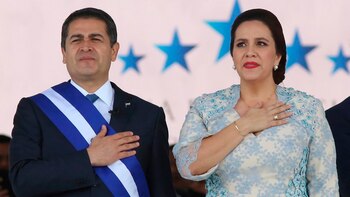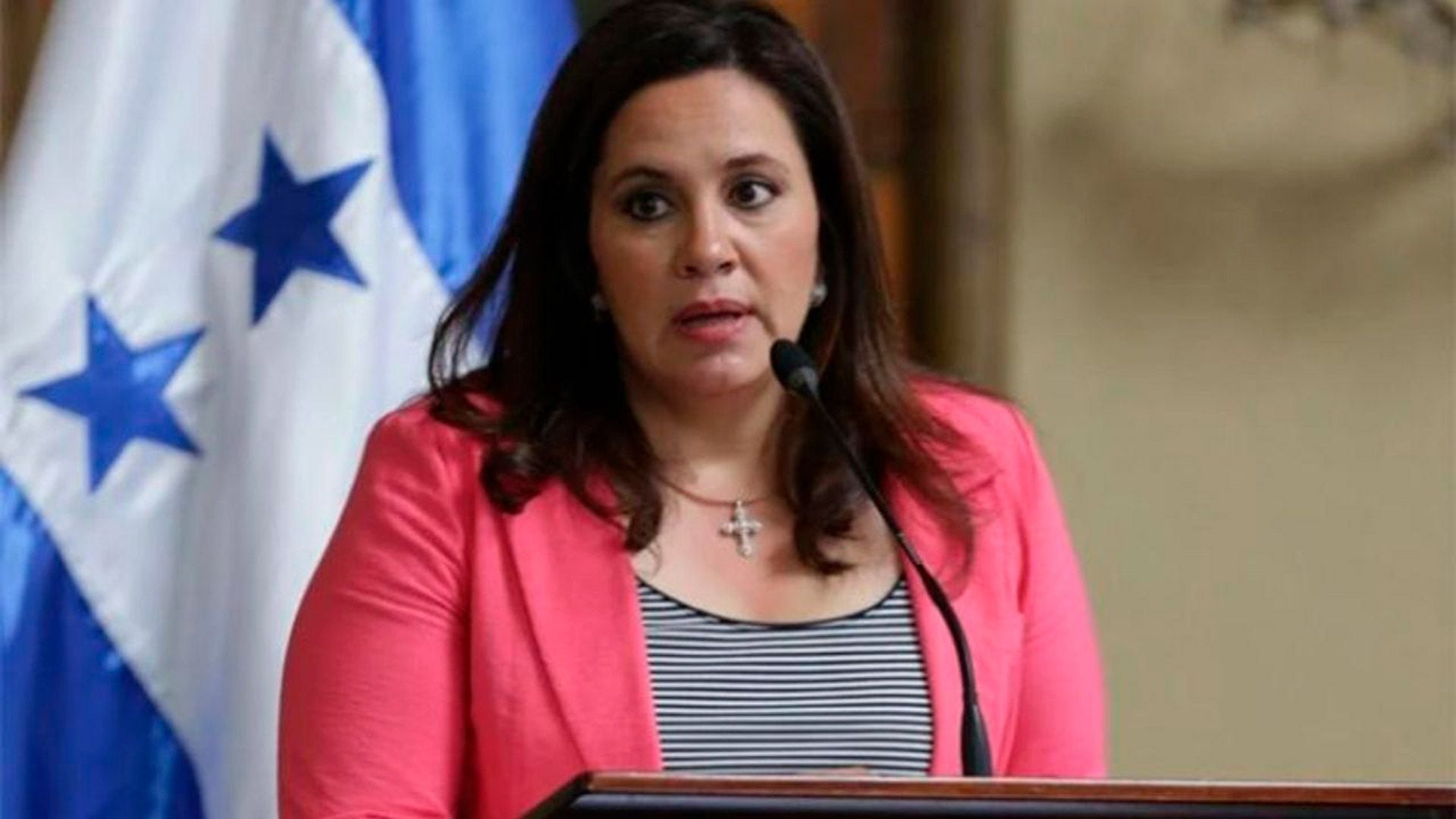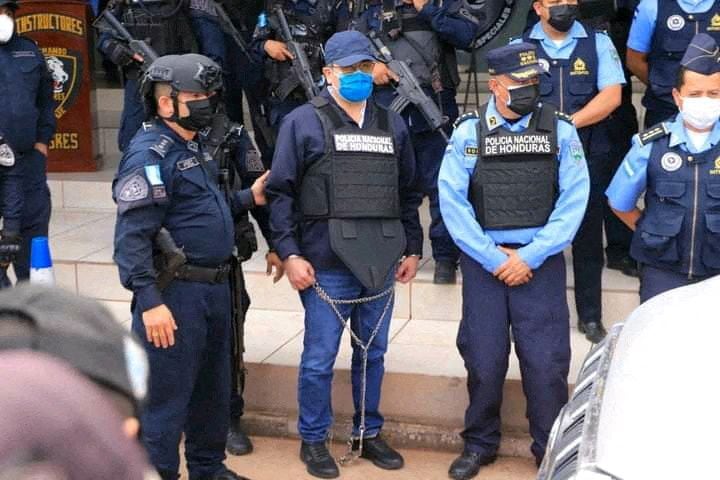
JOH, as he is known in Honduras, still has cards up his sleeve. On March 21 and 22, Ana Rosalinda García de Hernández, wife of the former president, transferred part of the family assets to FICOHSA, a Honduran bank, to try to prevent the state from confiscating property from the family when Hernandez is extradited to the United States.
In total, García de Hernández has made transfers of properties valued at 165.2 million lempiras, some USD 6.7 million, according to documents from the Honduran public registry held by Infobae. In addition to the transactions with FICOHSA, the former first lady had made a similar one in 2020 with Banco Atlántida.
In the movements of these millions of dollars, property and societies involving the entire Hernandez family are involved. In addition to the former presidential partner, the names of Juan Antonio “Tony” Hernández and Hilda Hernández, brothers of the former president, appear here. Tony was convicted and sentenced in 2021 in the United States to two life sentences without the possibility of parole for drug trafficking offenses. Hilda, who died in 2017, was the clan's financial brains until her death in a freak plane crash.
Public documents attesting to the transfer of goods through Honduran banks involve the Company Inversiones del Río S. De R.L, formed in December 2010 by JOH and Tony and in which Ana Rosalinda García de Hernández, the former first lady, appears as manager and partner; Hilda Hernandez was also a partner.
The document of transfer of the residence of “El Higuerito” by JOH's wife to the FICOHSA bank
Not all the money transferred to banks will remain in the hands of the Hernandez family, as explained by a financial analyst consulted in Honduras, who spoke with Infobae on condition of anonymity. “The trick is that these are goods purchased with financing from these banks. They return the property, the bank charges what they owe it and they keep the rest of the value,” said the specialist.
Infobae also learned that, in the Honduran bureaucracy, the process to register a property sale can take between two weeks and a month. In the case of the former president's assets, registrations were made in half an hour.
It is impossible to say for sure how much cash Juan Orlando Hernández has secured in recent days. The truth is, however, that all these properties are now in the name of the FICOHSA and Atlántida banks. That is, the bank keeps the properties, which makes them untouchable to the State, and the Hernandez keep part of the cash.
As of March 22, former first lady García de Hernández, acting as general manager of Inversiones del Rio, as representative of her husband and as debtor and donor to banks, had already transferred four properties. In general, what banks gave for the properties that García de Hernandez gave up far exceeds what the former presidential family had paid for them.
It appears in public instrument number 47 of the public registry in San Pedro Sula, for example, that, on March 22, 2022, García de Hernández handed over to Banco Financiera Comercial Hondurña S.A. (FICOHSA) a 1,200 square meter plot for which the bank paid 14.5 million lempiras, about USD 600,000. In 2006, according to public instrument number 68 of March 16 of that year, Juan Orlando Hernández acquired that property for USD 99,844.
On March 22, the former first lady delivered another urban lot to FICOHSA for 28.25 million lempiras, equivalent to about USD 1.16 million. Former President Hernandez had purchased that lot in 2013 for USD 240,995, according to public instrument number 50 of March 3 of that year.

A day earlier, on March 21, García de Hernandez had negotiated to pay for a rustic property called El Higuerito, of 945,610.45 square meters, for 28.99 million lempiras, about USD 1.8 million. Ana García herself had bought the farm in July 2016 for just under half the price she gave it to the bank.
The deals with FICOHSA include another advantageous clause for the Hernandez: the bank gives him 12 months to vacate and hand over the properties. That is, the former president's family will be able to continue to use the lots and the farm that he already gave to the bank even though, on paper, they are no longer theirs.
Other properties transferred, in the urbanization Villa Palmeras
Juan Orlando Hernández and his wife, in fact, had begun to dispose of their assets in October 2020. There was still time for Hernandez's National Party to lose the elections and for the president to be left without the judicial protection that his office gave him. At that point, however, Tony Hernández was already facing a trial for drug trafficking in the United States and evidence that also implicated JOH in the company of cocaine trafficking from Honduras was beginning to accumulate.
Public instrument number 227 of the public registry of October 6, 2020 attests that the then first lady, in her capacity as general manager of Inversiones del Rio, grants Banco Atlántida, also under the legal figure of dation in payment, “ten earth cavalries, thirty blocks and fifteen sevenths of knights of the known estate such as San Francisco de Corral in the department of Olancho. In total, 945,610 square meters that the bank valued at 41.2 million lempiras, about USD 1.7 million.
For the most recent movements, made with Banco FICOHSA, the Hernandez counted on the complicity of the Honduran State, which Juan Orlando Hernández controlled without opposition until their party lost the presidential election in November of last year. Even in March 2022, when JOH was already in a cell of the National Police (PN) in Tegucigalpa pending a court decision confirming the extradition request made by the United States, his wife was able to transfer property.
Juan Orlando Hernández lost his freedom on the morning of February 15, 2022, when he left his home in an exclusive neighborhood of Tegucigalpa and surrendered to the PN and army contingent that was waiting for him outside since the night before, when the State of Honduras received the extradition request issued by a judge in New York, United States, for the former president to answer for three crimes related to the trafficking of 500,000 kilograms of cocaine.
A few hours after the capture, the Secretary of Security guarded the properties of Hernandez and his family, pending the certification of an assurance and seizure order by the Honduran Public Prosecutor's Office.
On March 17, almost a month after the arrest, Manuel Díaz Galeas, head of the Attorney General's Office (PGR), asked the Public Ministry, through an official letter, “immediately request before the competent court measures to secure and seize all assets in his name the citizen Juan Orlando Hernández Alvarado, this because of the request for extradition submitted by the United States government, authorized by the natural judge appointed by the Supreme Court of Justice.”
Edwin Ortez, the judge appointed to decide on Hernandez's extradition, had authorized it that same day, on March 17. Two days later, on the 19th, the former president's defense filed an appeal to the Supreme Court. The PGR, then, reversed with the seizure of assets.
In a statement, the Attorney General's Office reported that “within the framework of respect for due process and legality, in view of the appeal filed by citizen Juan Orlando Hernández and until it is evacuated, the office addressed to Attorney General Óscar Chinchilla remains worthless and without effect.”
The Public Ministry, led by Chinchilla, an official close to Juan Orlando Hernández, only said it would proceed in coordination with other agencies.

The limbo that the Attorney and Prosecutor's Office created opened the window that former first lady Ana García de Hernández did not hesitate to take advantage of to, between March 21 and 22, make the banking movements that shielded part of the family's assets. On 28 March, six days later, the plenary session of the Supreme Court of Justice upheld the extradition decision.
Thus, the Hernandez secured part of a real estate estate that, according to preliminary investigations carried out by Infobae and other media outlets in Honduras, consists of at least 109 movable and immovable assets, whose value reaches 226.6 million lempiras, about USD 9.3 million. The total fortune of the former Honduran president, however, may be much greater, according to a senior Honduran law enforcement officer consulted.
And, apparently, JOH's lawyers have not yet exhausted attempts to delay the imminent extradition. On March 29, Melvin Duarte, spokesman for the Honduran Supreme Court, confirmed that the defense of the former president filed an application for amparo against the decision taken by the same court to confirm the extradition. This may give Juan Orlando Hernández more weeks in the Honduran cell where he now spends his nights.
A third property owned by the Hernandez, transferred in recent days to Banco Atlántida
Since it was the plenary session of 15 judges of the CSJ that heard the appeal of the decision in favor of extradition given by the court of first instance, everyone must excuse themselves from hearing the amparo. Alternate magistrates must then summon the constitutional court which will decide on this last judicial remedy. This may take several weeks.
Meanwhile, if the PGR and the Public Prosecutor's Office do not change their decision not to ensure the seizure of JOH's and his family's assets, the former first lady will be able to continue negotiating transfers with banks in the Honduran system that, judging by what has already been done, have no qualms about receiving the estates, lots and properties of the extraditable.
KEEP READING:
Últimas Noticias
Debanhi Escobar: they secured the motel where she was found lifeless in a cistern
Members of the Specialized Prosecutor's Office in Nuevo León secured the Nueva Castilla Motel as part of the investigations into the case

The oldest person in the world died at the age of 119
Kane Tanaka lived in Japan. She was born six months earlier than George Orwell, the same year that the Wright brothers first flew, and Marie Curie became the first woman to win a Nobel Prize

Macabre find in CDMX: they left a body bagged and tied in a taxi
The body was left in the back seats of the car. It was covered with black bags and tied with industrial tape
The eagles of America will face Manchester City in a duel of legends. Here are the details
The top Mexican football champion will play a match with Pep Guardiola's squad in the Lone Star Cup

Why is it good to bring dogs out to know the world when they are puppies
A so-called protection against the spread of diseases threatens the integral development of dogs




